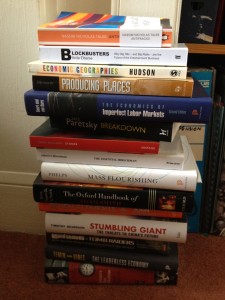My thanks to Professor Ian Preston of University College London for the earliest definition (in England) of the subject of economics – it’s from the 1827 Statement by the Council of the University of London Explanatory of the Nature and Objects of the Institution:
The object of the science of Political Economy is to ascertain the laws which regulate the production, distribution and consumption of wealth, or the outward things obtained by labour, and needed or desired by man. It is now too justly valued to require any other remark, than the occasional difficulty of applying its principles, and the differences of opinion to which that difficulty has given rise, form new reasons for the diligent cultivation of a science which is so indispensable to the well-being of communities, and of which, as it depends wholly on facts, all the perplexities must finally be removed by accurate observation and precise language.
The wonderfully Victorian optimism contrasts with Nassim Taleb’s disdain for economists, which bellows from every other page of [amazon_link id=”0141038225″ target=”_blank” ]Antifragile[/amazon_link]. I’m rather enjoying it so far, but he has a very low opinion of economists, especially those of us who are Harvard-trained (he always refers to it as ‘Stalin-Harvard’). He has it in for nail polish too, and as I occasionally wear it, that’s another strike against me. However, he does like Ariel Rubinstein’s [amazon_link id=”1906924775″ target=”_blank” ]Economic Fables[/amazon_link], an excellent book (and winner of the 2012 Enlightened Economist Prize).
[amazon_image id=”0141038225″ link=”true” target=”_blank” size=”medium” ]Antifragile: Things that Gain from Disorder[/amazon_image]
I met Taleb once – it was in late 2001 at the launch in London of my book [amazon_link id=”1587991454″ target=”_blank” ]Paradoxes of Prosperity,[/amazon_link] around the same time as [amazon_link id=”0141031484″ target=”_blank” ]Fooled by Randomness[/amazon_link] was published and about to make him massively famous. He had shaved his beard and was travelling as ‘Nicholas’ not ‘Nassim’ at the time, I recall him telling me. He was charming and polite, far from the aggressive and slightly deranged – although hugely interesting – persona that comes across in his books. [amazon_link id=”0141034599″ target=”_blank” ]The Black Swan[/amazon_link] and [amazon_link id=”0141031484″ target=”_blank” ]Fooled by Randomness[/amazon_link] are both great reads containing much sense, so I’m looking forward to the rest of [amazon_link id=”0141038225″ target=”_blank” ]Antifragile[/amazon_link]. And I don’t believe economics to be wholly incompatible with Taleb’s worldview – just look at that 1827 definition.

